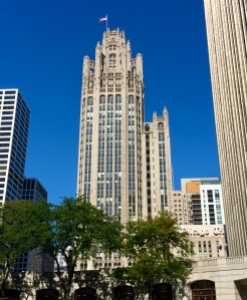
Patrick Soon-Shiong came along too late to make the cut. In mid-2018, the celebrity surgeon bought the Los Angeles Times and several other papers for $500 million. My book about a new generation of wealthy newspaper owners, “The Return of the Moguls,” had just been published.
Too bad. Soon-Shiong is at least as interesting as the owners I wrote about: Jeff Bezos, who bought The Washington Post and re-established the legendary paper as a powerhouse; John Henry, who slowly transformed The Boston Globe into a growing and profitable enterprise; and Aaron Kushner, who poured money into the Orange County Register only to fail at attracting enough advertisers and readers to pay for his profligate spending.
Please support this free source of news and commentary by becoming a member of Media Nation for just $5 a month.
Now Politico has weighed in with a lengthy story about the Times under Soon-Shiong that portrays his ownership as something of a mixed bag. He’s invested in the paper, reversing years of cost-cutting by its previous owner, Tribune Publishing (which for a time was known as tronc), and he’s put a highly regarded editor, Kevin Merida, in charge of the newsroom. But his interest in the paper seems to wax and wane, and his daughter, Nika Soon-Shiong, is portrayed as interfering in the newsroom.
I have to say that I’m puzzled by some of the wailing. The Politico article, by Daniel Lippman, Christopher Cadelago and Max Tani, claims that Nika Soon-Shiong has inserted herself into the process of endorsing political candidates as though that were somehow a bad thing. Now, the Times may be making some dumb endorsements, such as its decision to back Nika Soon-Shiong ally Kenneth Mejia for city controller. Mejia, according to the Times’ own reporting, regards both Joe Biden and Donald Trump as “sexual predators.”
But a newspaper’s owners are free to insert themselves into the opinion pages as much as they’d like. A good owner will keep a distance from news operations, but the opinion section is their playground. John and Linda Henry are involved in the Globe’s editorial pages and no one thinks anything of it. Jeff Bezos’ lack of interest in the Post’s opinion operation is unusual.
Nika Soon-Shiong has also expressed her leftist views in a tweet (which she deleted) critical of her own paper’s crime coverage and in suggestions for story coverage. There is, for instance, this, which I find entirely benign, even salutory:
In 2020, Nika Soon-Shiong started participating in staff meetings about the paper’s failures in covering race and how it could become more inclusive in hiring. She suggested the paper avoid using the word “looting” when covering the unrest over police brutality, which inspired the paper to tweak style guidelines.
Times company leaders at the time asked then-top opinion editor Sewell Chan to brainstorm ways that Nika Soon-Shiong could get more involved in the paper. He talked with her about whether working with the opinion section would be a possibility. (Chan declined to comment.)
Politico quotes Merida as saying that Nika Soon-Shiong has “a right to critique our journalism, offer story ideas and other suggestions she believes will help make us better,” and that the “same right is extended to those we cover and to those who read us.” The fact-checker rates that statement as 100% true.
Patrick Soon-Shiong is a bit of an oddball. A profile in The New Yorker last year by Stephen Witt raised questions about his success as a pharmaceutical entrepreneur. But he has been a far better owner of the LA Times and The San Diego Union-Tribune, a throw-in that was part of the Times deal, than Tribune Publishing had been. Indeed, Soon-Shiong’s one unforgivable act as a newspaper owner was a non-act — his decision to do nothing to stop the sale of Tribune to the hedge fund Alden Global Capital, which of course began gutting its papers as soon as the deal was consummated.
Tribune owns some of our most storied newspapers, including the Chicago Tribune, The Baltimore Sun and the Hartford Courant — the oldest continuously published newspaper in the country. Soon-Shiong, a billionaire, could have stopped the transaction and helped Baltimore hotel magnate Stewart Bainum with his bid to buy the chain. Instead, Alden wound up with Tribune, and Bainum has launched a digital nonprofit called The Baltimore Banner. In an interview with Brian Stelter, then of CNN, Soon-Shiong protested that he was a “passive investor,” adding: “I’ve got my hands full and frankly, really committed to the LA Times and San Diego Union-Tribune.”
The Los Angeles Times is far better off under Soon-Shiong family ownership than it had been under years of Tribune mismanagement — mismanagement that would have turned into a rout under Alden. The Politico piece contains some interesting tidbits, but it’s hardly a takedown.





